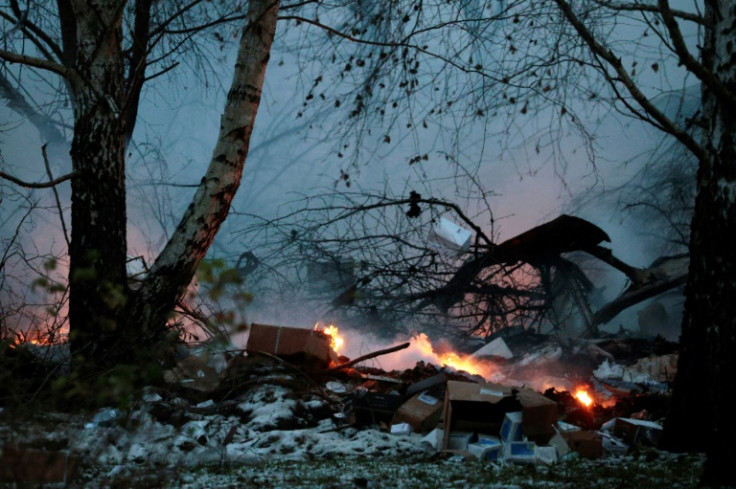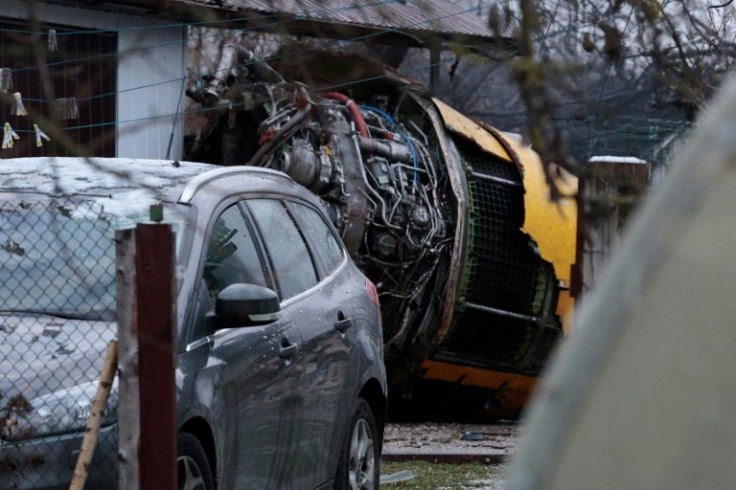
A DHL cargo plane crashed Monday near the Lithuanian capital's airport, killing one crew member, with Germany raising the possibility of outside involvement in the disaster.
While authorities stopped short of linking the tragedy to a recent series of sabotage cases, Lithuanian officials have in past weeks probed alleged acts of incendiary devices being planted on cargo planes.
The plane, which had arrived from the German city of Leipzig, crashed about one kilometre (0.6 miles) from Vilnius airport having hit several buildings as it skidded several hundred metres, according to the police and the DHL logistics company.
Images from the crash site showed debris from the plane and packages on fire scattered across a residential area cordoned off by the emergency services.
"So far, there are no signs or evidence suggesting this was sabotage or a terrorist act," Defence Minister Laurynas Kasciunas told reporters, adding the probe to establish the cause could take "about a week".
State Security Department chief Darius Jauniskis said that while the Baltic country had seen "an increasingly aggressive Russia and could not "rule out the case of terrorism... we cannot make any attributions or point fingers yet".
Echoing that caution, Lithuania's Prime Minister Ingrida Simonyte urged people in a social media post to "refrain from jumping to conclusions" during the investigation.
But German Foreign Minister Annalena Baerbock said "we must now seriously ask ourselves whether this was an accident or whether it was another hybrid incident".
The term "hybrid" is commonly used to describe attacks that do not use conventional military tactics, such as sabotaging infrastructure or launching cyberattacks.
Since Russia's invasion of Ukraine in 2022, European countries have often used the term to describe actions against them that they believe originate from Moscow.
According to police, the plane skidded several hundred metres, hitting a residential building which caught fire, along with smaller buildings and a car.
Firefighters said one of the four crew died in the crash.
Police said the deceased person was Spanish, and that the three other crew members were Spanish, German and Lithuanian nationals. One was critically injured.
The emergency services said the house hit by the plane was evacuated and its 12 residents moved to safety.
"We were woken by an explosion. Through the window, we saw the wave of explosions and a cloud of fire. Like fireworks," Stanislovas Jakimavicius, who lives near the crash site, told AFP.
German logistics company DHL said the aircraft was operated by its partner SwiftAir and had been attempting an "emergency landing" early in the morning.
A German transport ministry official said the country's Bureau of Aircraft Accident Investigation "will support the investigation on site".
It was not immediately clear what caused the crash.
Earlier this month Lithuania carried out arrests as part of a criminal probe into sending incendiary devices on Western-bound planes.
According to Polish and Lithuanian media, the devices, including electric massagers implanted with a flammable substance, were sent from Lithuania to Britain in July and could be behind a lorry fire outside Warsaw.
UK anti-terrorism police last month said they were investigating how a parcel burst into flames at a depot earlier this year, after a similar case in Germany blamed on Russia.
The Lithuanian president's chief security adviser blamed Moscow for the incidents.
"We know who the source of these operations is. It is Russian military intelligence," Kestutis Budrys told Ziniu radio earlier this month.
"We cannot let this go unanswered as it will only escalate into the new kinds of actions," Budrys added.
Poland and Lithuania, both NATO members bordering Russia, are staunch allies of Ukraine, frequently warning about Russian-inspired sabotage on EU soil.









